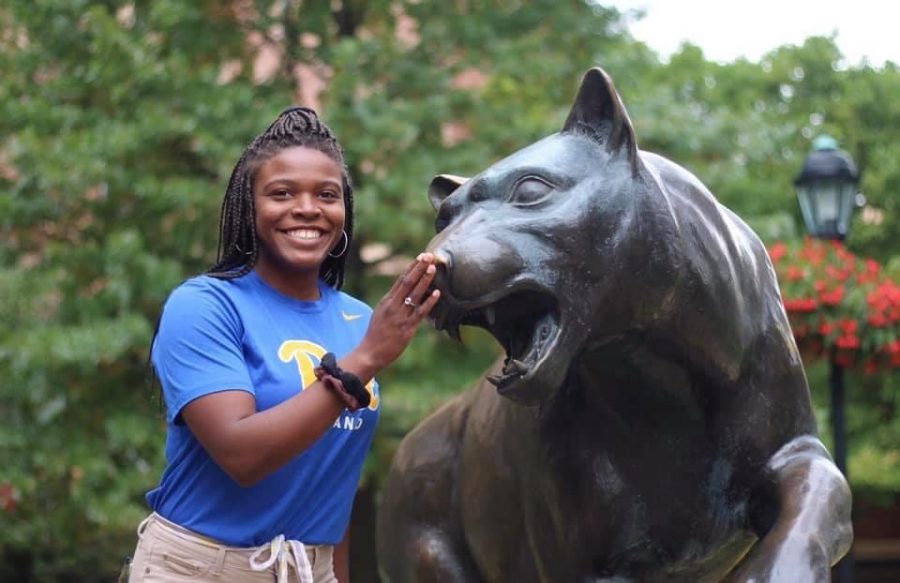Pitt Pathfinders use virtual tours to connect students to Pitt in new ways
Photo courtesy of De’Jovia Davis
Pitt Pathfinder and junior psychology and urban studies major De’Jovia Davis.
September 4, 2020
Students won’t have to worry about getting run over by backward-walking, striped-shirt-clad Pitt Pathfinders around campus this semester. But that doesn’t mean Pathfinders aren’t showing off the campus to potential Pitt students.
Using Zoom and 360-degree video, the Pathfinders are still hosting daily virtual tours for potential students from all over the world who want to see the Cathedral of Learning from their bedroom. Alana Karras, the president of the Pathfinders, said she’s having fun engaging with prospective students in this new digital landscape. On a recent tour, Karras said she was asked a question about the view Downtown.
“I was able to jump over to the view from the [Duquesne] Incline, and show them how Downtown looks,” Karras, a senior biology major, said. “So there are some silver linings to giving a virtual tour and that’s definitely one of them.”
Before the COVID-19 pandemic, Pitt offered daily tours that prospective Pitt students attended to explore campus and talk to current students about their experiences. But, because no visitors are allowed on campus for at least the rest of this year, the Office of Admissions and Financial Aid and the Pathfinders had to totally reinvent their programs.
Molly Swagler, the assistant vice provost for enrollment and executive director for enrollment outreach, said the OAFA’s work focuses on listening to students’ needs and making their programs as creative as possible with the introduction of Pitt Unscripted.
Pitt Unscripted, OAFA’s new virtual admissions platform, is focused on Pitt students’ differences and letting prospective students explore their individual interests.
“It’s all about a student writing their own brand in a time of uncertainty,” Swagler said.
Swagler said an important part of admissions events — whether they’re conducted in-person or virtually — is that prospective students meet current students. She said a Pathfinder is matched with a prospective student based on common traits like out-of-state status, majors or hobbies.
And some prospective students agree that interacting with current students is an important factor in the college decision making process. Ana Depres, a high school senior from Knoxville, Tennessee, said hearing from current students was helpful.
“These events have made the admissions process seem less intimidating,” Depres said. “Although it’s a lot of work, the sessions made it seem simple and not entirely impossible. I feel much more educated about college applications in general.”
Pitt Pathfinder De’Jovia Davis said even though she doesn’t get to show off her backward walking skills, these virtual meetings allow her to show what Pitt means to her and connect with potential students.
“If I was in a virtual setting I don’t know what that would be like, but just sharing what Pitt has been to me — it’s been a home, it’s been a place where I can explore opportunities and strengthen my passions — helps the students see how much I love Pitt and what Pitt means to me beyond just the facts and statistics,” Davis, a junior psychology and urban studies double major, said.
Heather Howe, the director of visitor engagement at the OAFA, said online tours remove some of the financial barriers to visiting campus for prospective students. She said this is proven by a 30% increase in virtual visitors over the summer.
Swagler added that this increase is also due to no physical seating capacity limits and more programs at all hours of the day to accommodate people in different time zones. She said the OAFA is trying to become more accessible by utilizing more technology, like text messages and a chat feature over email and on its website.
Howe said one of the most memorable parts of in-person visits — especially the accepted students’ days — is the amount of excitement, energy and Pitt spirit. One of the traditions is to throw confetti, cheer and have a student ring a bell when they put their deposit down on one of these days. Even without being in-person, Howe said she hopes those feelings can transfer to the virtual environment as well.
“They used to come to campus and spend a whole day with us, and we could shower them in the University of Pittsburgh,” she said. “We need to make them feel that love in the virtual world. That’s what we’ve tried to do from the middle of March to right now.”
Kyra King, a high school senior from Clarksburg, Maryland, said she feels like the online options have been helpful, but it’s still no replacement for being on campus. King said although it’s nice to have the 360-degree tour, she didn’t get a grasp of the layout of the school or how it felt in the city.
“I feel like online programs struggle to cover student life as well as in-person visits can,” King said. “It’s hard for a prospective student to get a feel for the current students there and the atmosphere of the school.”
Karras said the virtual shift has been difficult for some Pathfinders because it is difficult to express their love for Pitt virtually as opposed to an in-person event.
“Everyone is in this organization because they have a lot of positive energy they want to share,” Karras said. “One of the challenges has been, ‘I have all of this positive energy and I love Pitt so much and how do I make that known in the virtual setting?’”
Despite struggling sometimes to connect to students, Davis said she feels the virtual tours have been fulfilling.
“We just want students to continue to take tours and come to our programs because first of all, we want them to know as much about Pitt as possible,” Davis said. “But second, we want them to enjoy it as much as we enjoy doing it.”








